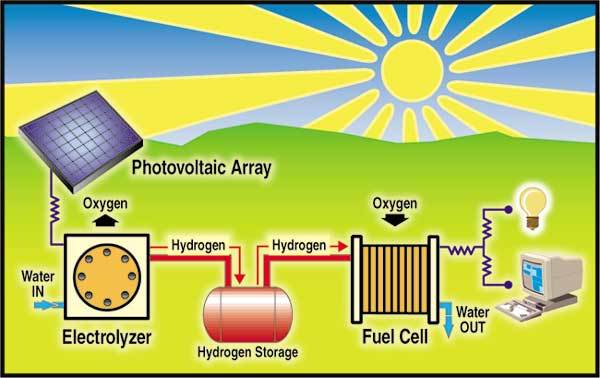Since launching this blog a year ago I have spent a lot of time covering the cycles of American politics. I have described past cycles, shown where we are relative to those cycles, and created some fun games.
I explained how the Nixon political thesis under which we have all operated since 1968 — a set of myths and values meant to sustain power — are becoming obsolete by new issues it wasn’t crafted to deal with. And I described how a new thesis, one based on Internet or Open Source values, is rising to meet these challenges.
There is a book in this, and if anyone wants to buy it I’ll write it. But rather than continue hammering something few are reading I have decided to focus on the heart of the new crisis now enveloping us, the crisis which the Internet Thesis I have written about is meant to address.
This is The War Against Oil.
(The illustration is from the Schatz Energy Research Center at the University of Humboldt in California.)
The war against oil is the first step in the larger struggle to save the planet, described so admirably by the movie An Inconvenient Truth.
The War Against Oil will take place on many levels, all of which I hope to cover intensively. There is the political dimension, the foreign policy dimension, the economic dimension, the technology dimension and the investment dimension.
There are false hopes, like biodiesel, which replaces oil but not the hydrocarbon process that drives global warming, or uranium, which carries its own environmental price. Both have extensive lobbies, as do advocates of coal, which means more American energy production but no help on the underlying problem.
What will be most difficult to find, I think, are true replacements. The most important is the hydrogen cycle. We know how this cycle works. Electrolysis uses electricity to separate oxygen from hydrogen in water. The hydrogen can then be combined with oxygen, producing power and water as a byproduct. This is how rockets work but under controlled conditions cars can run on the same principle.
The problem lies in creating the hydrogen. Energy must be fed into the system, but this energy can’t come from hydrocarbons or there is no gain. Worse (in a way) is the fact that you’re looking to produce electricity in order to drive the process, and if you’ve got electricity already why now just use it?
Scientists and engineers are working on just these problems, and are going to create answers that entrepreneurs will want to offer to investors, and to the government. An open process can assure that as few people as possible get taken in. A closed proprietary process will slow progress and lead to more rip-offs.
It’s a huge story, one I feel will be worth my time to cover and your time to read. I hope you enjoy the ride.













“There’s a book in this.” Why not do what John Xenakis did with his “Generational Dynamics” and put it up on your website as whatever format suits you? Then what John did was sell it as a POD. (I bought a copy)I know, publishers and reviewers think PODs have serious cooties. Still, for a straw in the wind, it’s a thought.
His seriously revised version is still web-only.
“There’s a book in this.” Why not do what John Xenakis did with his “Generational Dynamics” and put it up on your website as whatever format suits you? Then what John did was sell it as a POD. (I bought a copy)I know, publishers and reviewers think PODs have serious cooties. Still, for a straw in the wind, it’s a thought.
His seriously revised version is still web-only.
Biodiesel & uranium don’t help global warming, but they sure do help Crisis #2, Peak Oil.
Biodiesel & uranium don’t help global warming, but they sure do help Crisis #2, Peak Oil.
You are very wrong about what you call false hopes. This is not a binary question. Power sources that are better, but not perfect, should not be ignored. Increased reliance on biodiesel and nuclear power would drastically reduce our carbon footprint. Practical zero pollutant solutions are decades away. Why should our only choices be to continue to use the really bad fossil fuels or abandon modern civilization until zero hydrocarbon solutions are perfected? Why be such an extremist? Why not use biodiesel and nuclear as a transitional solution until the zero pollution technology is ready? By couching the debate in such absolutist terms you help those that favor sticking with fossil fuels until they are completely exhausted.
You are very wrong about what you call false hopes. This is not a binary question. Power sources that are better, but not perfect, should not be ignored. Increased reliance on biodiesel and nuclear power would drastically reduce our carbon footprint. Practical zero pollutant solutions are decades away. Why should our only choices be to continue to use the really bad fossil fuels or abandon modern civilization until zero hydrocarbon solutions are perfected? Why be such an extremist? Why not use biodiesel and nuclear as a transitional solution until the zero pollution technology is ready? By couching the debate in such absolutist terms you help those that favor sticking with fossil fuels until they are completely exhausted.
Anxiety and wellbutrin.
Anxiety and wellbutrin. Wellbutrin.